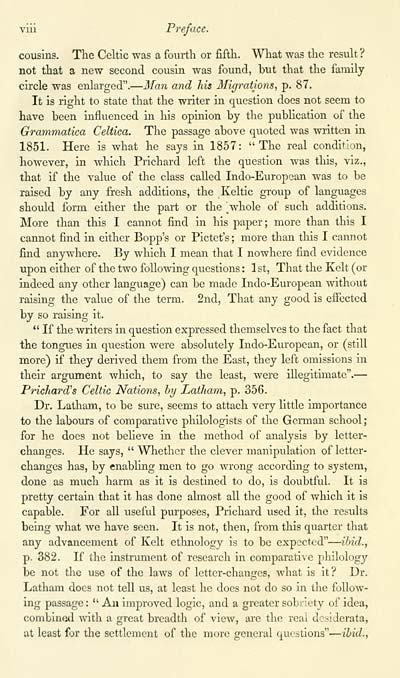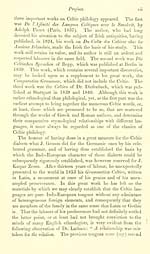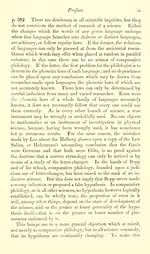Blair Collection > Celtic studies
(12)
Download files
Complete book:
Individual page:
Thumbnail gallery: Grid view | List view

viii Preface.
cousins. The Celtic was a fourth or fifth. What was the resuh?
not that a new second cousin was found, but that the family
circle was enlarged". — Man and his Migrations, p. 87.
It is right to state that the writer in question does not seem to
have been influenced in his opinion by the pubKcation of the
Grammatica Celtica. The passage above quoted was written in
1851. Here is what he says in 1857: "The real condition,
however, in which Prichard left the question was this, viz.,
that if the value of the class called Indo-European was to be
raised by any fresh additions, the Keltic group of languages
should form either the part or the ^whole of such additions.
More than this I cannot find in his paper; more than this I
cannot find in either Bopp's or Pictet's ; more than tliis I cannot
find anywhere. By which I mean that I nowhere find evidence
upon either of the two following questions : 1 st, That the Kelt (or
indeed any other language) can be made Indo-European without
raising the value of the term. 2nd, That any good is efiected
by so raising it.
*' If the writers in question expressed themselves to the fact that
the tongues in question were absolutely Indo-European, or (still
more) if they derived them from the East, they left omissions in
their argument which, to say the least, were illegitmiate". —
Prichard's Celtic Nations, by Latham, p. 356.
Dr. Latham, to be sure, seems to attach very little importance
to the labours of comparative philologists of the German school ;
for he docs not beheve in the method of analysis by letter-
changes. He says, " Whether the clever manipulation of letter-
changes has, by enabling men to go wrong according to system,
done as much harm as it is destined to do, is doubtful. It is
pretty certain that it has done almost all the good of which it is
capable. For all useful purposes, Prichard used it, the results
being what we have seen. It is not, then, from this quarter that
any advancement of Kelt ethnology is to be expected" — ibid.,
p. 382. If the instrument of research in comparative philology
be not the use of the laws of letter-changes, what is it? Dr.
Latham docs not tell us, at least he does not do so in the follow-
ing passage : " An improved logic, and a greater sobiiety of idea,
combined with a great breadth of view, are the real desiderata,
at least for the settlement of the more general questions" — ibid.,
cousins. The Celtic was a fourth or fifth. What was the resuh?
not that a new second cousin was found, but that the family
circle was enlarged". — Man and his Migrations, p. 87.
It is right to state that the writer in question does not seem to
have been influenced in his opinion by the pubKcation of the
Grammatica Celtica. The passage above quoted was written in
1851. Here is what he says in 1857: "The real condition,
however, in which Prichard left the question was this, viz.,
that if the value of the class called Indo-European was to be
raised by any fresh additions, the Keltic group of languages
should form either the part or the ^whole of such additions.
More than this I cannot find in his paper; more than this I
cannot find in either Bopp's or Pictet's ; more than tliis I cannot
find anywhere. By which I mean that I nowhere find evidence
upon either of the two following questions : 1 st, That the Kelt (or
indeed any other language) can be made Indo-European without
raising the value of the term. 2nd, That any good is efiected
by so raising it.
*' If the writers in question expressed themselves to the fact that
the tongues in question were absolutely Indo-European, or (still
more) if they derived them from the East, they left omissions in
their argument which, to say the least, were illegitmiate". —
Prichard's Celtic Nations, by Latham, p. 356.
Dr. Latham, to be sure, seems to attach very little importance
to the labours of comparative philologists of the German school ;
for he docs not beheve in the method of analysis by letter-
changes. He says, " Whether the clever manipulation of letter-
changes has, by enabling men to go wrong according to system,
done as much harm as it is destined to do, is doubtful. It is
pretty certain that it has done almost all the good of which it is
capable. For all useful purposes, Prichard used it, the results
being what we have seen. It is not, then, from this quarter that
any advancement of Kelt ethnology is to be expected" — ibid.,
p. 382. If the instrument of research in comparative philology
be not the use of the laws of letter-changes, what is it? Dr.
Latham docs not tell us, at least he does not do so in the follow-
ing passage : " An improved logic, and a greater sobiiety of idea,
combined with a great breadth of view, are the real desiderata,
at least for the settlement of the more general questions" — ibid.,
Set display mode to: Large image | Transcription
Images and transcriptions on this page, including medium image downloads, may be used under the Creative Commons Attribution 4.0 International Licence unless otherwise stated. ![]()
| Early Gaelic Book Collections > Blair Collection > Celtic studies > (12) |
|---|
| Permanent URL | https://digital.nls.uk/75771314 |
|---|
| Description | A selection of books from a collection of more than 500 titles, mostly on religious and literary topics. Also includes some material dealing with other Celtic languages and societies. Collection created towards the end of the 19th century by Lady Evelyn Stewart Murray. |
|---|
| Description | Selected items from five 'Special and Named Printed Collections'. Includes books in Gaelic and other Celtic languages, works about the Gaels, their languages, literature, culture and history. |
|---|

